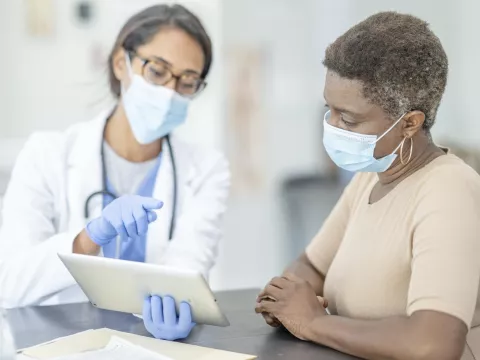- AdventHealth

Because high blood pressure usually comes without signs or symptoms, it is sometimes called a “silent killer.”
High blood pressure slowly damages our arteries and makes us more vulnerable to heart attack and stroke. All women should pay attention to their blood pressure, but it is especially critical to women who:
- are pregnant
- are taking oral birth control
- have gone through menopause
If you or or a loved one fit one or more of these categories, learning about the health concerns posed by high blood pressure (also called hypertension) can help you take steps to stay safe.
Pregnancy
Many pregnant women with high blood pressure have healthy pregnancies and healthy babies. However, the condition can be life-threatening for some women and their unborn children.
Pregnant women suffer from these types of high blood pressure:
Chronic hypertension: High blood pressure that occurs before the woman gets pregnant or before the 20th week of pregnancy. This can affect the baby’s growth.
Gestational hypertension: High blood pressure that appears after 20 weeks of pregnancy. This can increase the mother’s risk of developing hypertension later in life.
Preeclampsia: A more serious form of pregnancy-related hypertension that occurs after the 20th week of pregnancy. Left untreated, preeclampsia can cause low birth weight, premature delivery, and serious risks for the mother and baby.
To learn more about how blood pressure can affect your pregnancy, read our post.
If you have high blood pressure, these steps can make pregnancy safer for you and your baby.
Before Pregnancy
Ask your doctor what you can do to lower your blood pressure. Such steps might include:
- losing weight
- not smoking
- exercising
- taking medication as prescribed
During Pregnancy
Here’s how to get this important conversation started during a pregnancy:
- Ask your doctor if your blood pressure medication is safe to take during pregnancy.
- Visit your doctor early and often in your pregnancy so your condition can be monitored.
- Tell your doctor right away if you have any symptoms of preeclampsia, such as headaches, vision problems, rapid weight gain, and swelling.
Oral Birth Control
Some women who take birth control pills experience an increase in blood pressure. To lower their risk for heart attack or stroke, women should be screened for high blood pressure before taking the pill, and should have their blood pressure monitored carefully while on it.
After Menopause
The risk of developing high blood pressure increases significantly after menopause. All women who have gone through menopause should have their blood pressure checked frequently.
The bottom line: Whatever the cause of your high blood pressure, working with your doctor to bring it under control is crucial to your health and longevity.
The whole-person heart health provided at AdventHealth ranges from preventive screening to medication management to complex operations. No matter your story, we’re with you for the long haul.
Learn more about our specialized heart and vascular care and how we care for your whole health.




